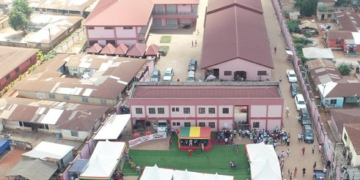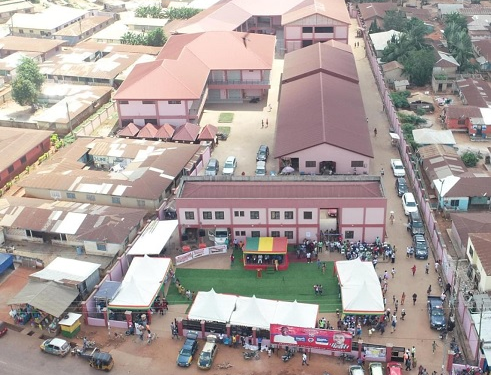The Ministry of Local Government, Decentralisation and Rural Development has inaugurated two modern markets in the Bono East Region to boost local commerce and enhance essential services.
The projects, which are part of the $245 million World Bank-funded Ghana Secondary Cities Support Programme (GSCSP), were unveiled at separate ceremonies in Techiman and Nkoranza by the sector Minister, .
The newly completed Nana Abena Market in the Techiman South Metropolis comprises 122 lockable stores and 68 market stalls, along with an administration block, a creche, a restaurant, and a dedicated meat shop.
The market also features fire, police, and health posts, modern washrooms, and an integrated drainage system designed to improve sanitation.
Infrastructure includes paved walkways, perimeter fencing for security, and streetlights to enhance safety and accessibility.
Similarly, the Nkoranza New Market, located in the Nkoranza South Municipality, boasts a two-storey block with 50 lockable stores and 100 market stalls.
The development includes a two-unit creche, police and health posts, modern sanitary facilities, and mechanised boreholes to ensure a reliable water supply. These features are intended to create a safe and conducive environment for traders and their families.
During the inauguration, Mr. Korsah highlighted the transformative impact of the markets on the local economy, noting that the facilities symbolised the government’s commitment to fostering resilient communities and supporting sustainable growth.
He urged municipal authorities to prioritise the maintenance of the facilities to ensure their long-term benefits.
“Having spent huge sums of money to provide these facilities, one important task I want to give to the Municipal Chief Executives is to ensure that this market is put to good use and adequately maintained,” he stated.
The minister also addressed the challenges posed by rising urbanisation, which now sees over 50% of Ghana’s population living in urban areas.
He explained that rapid urban growth strains existing infrastructure and service delivery, underscoring the importance of initiatives like the GSCSP.
The programme aims to enhance urban management and development, ensuring that local economies flourish while providing essential services to the population.

































